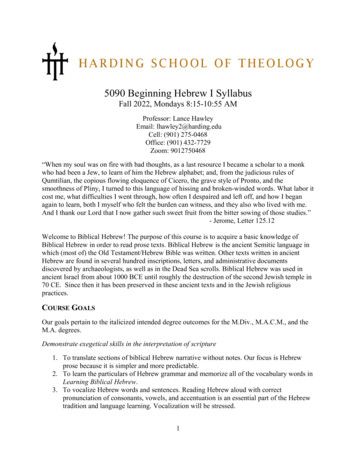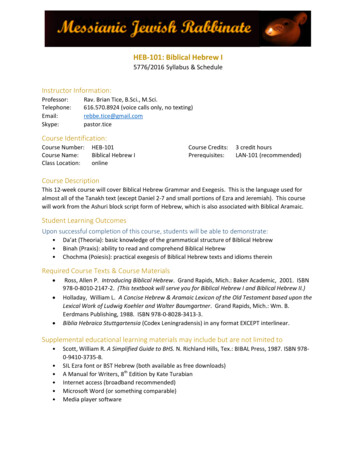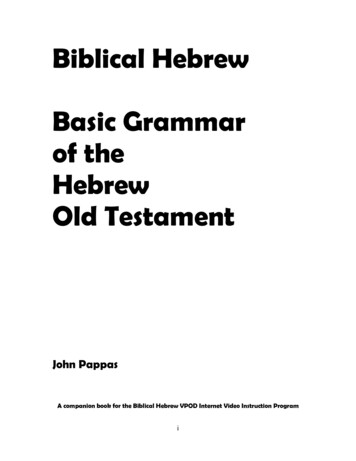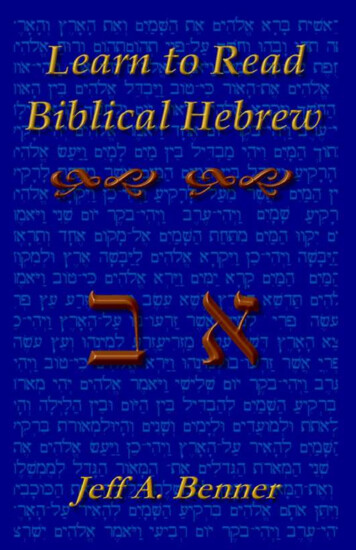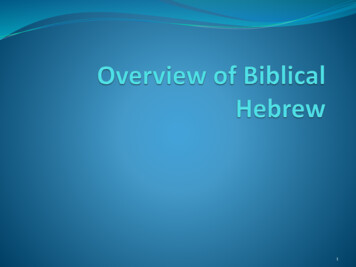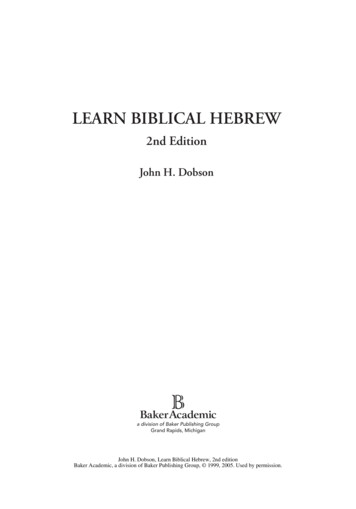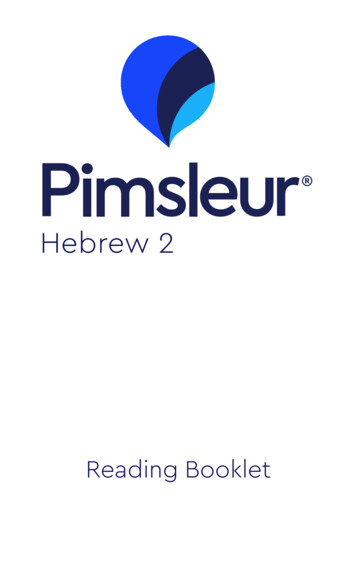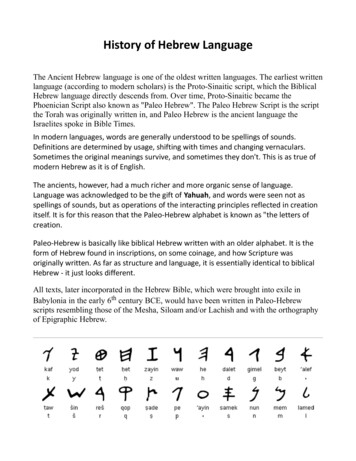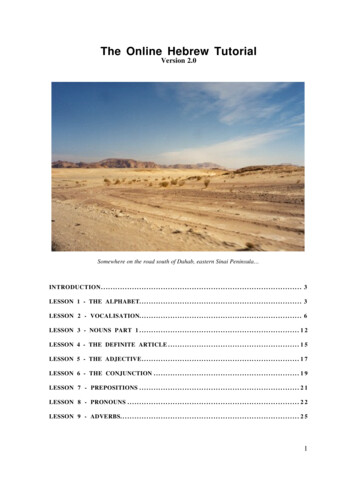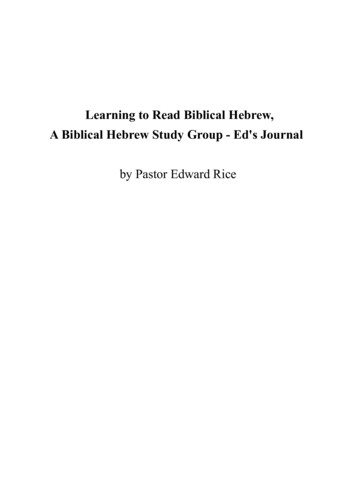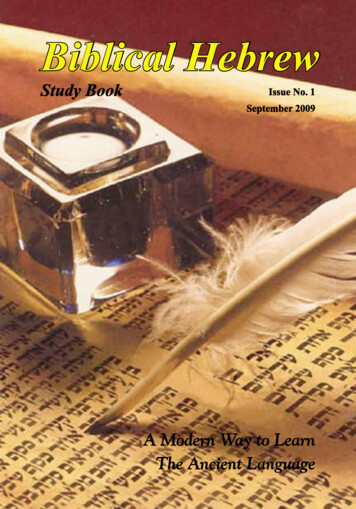
Transcription
Biblical HebrewStudy BookIssue No. 1September 2009A Modern Way to LearnThe Ancient Language
Biblical HebrewStudy BookEditor-in-ChiefYigal Tzadkayigal@hebrewtoday.comEnglish EditorShoshana BrickmanHebrew EditorDafna Glazer-AmirGraphic DesignKav U'chtavPublisherGood Times Ltd. 972-2-643-715352 Hechalutz StreetJerusalem, 96269Front page photo:Accessories of a Torah Scribe. A Torahis written with a quill pen or reed. Torahscribes also use a magnifying glass, tomake sure that everything is correct.SubscriptionsLiora Tzadkaorders@hebrewtoday.comBack page photo:A page from a German PassoverHaggadah from the Middle Ages.Websitewww.hebrewtoday.com All rights reserved.Copying material from this publicationwithout written permissionis strictly forbidden.Dear Readers,If you have any questions, or if you'dlike us to focus on a specific Biblicalword or paragraph, don't hesitateImportant Noteand let us know. Write to us atThe booklet you are holding is sanctifiedyigal@hebrewtoday.com and we'lldue to the holy texts printed in itstry to address your questions, eitherpages. Please take care of the bookletby email or in the next issue of ouraccordingly, and treat it with respect.Biblical Hebrew Study Book.2
Table of ContentsA Few Words from the Editor .4The Source (Genesis 1:1-13) .5-8Selected Words from the Source .9-12Meanings of the Names of the Five Books of Moses .13-15Word of the Month .16-17Letters of the Hebrew Alphabet .18-19Modern Words with Ancient Roots .20-21The Septuagint: One Book, Seventy Translations .22-23Picture of the Month .24The Word Behind the Picture .25-26Activity: Improving Understanding of Spoken Biblical Hebrew .27-28Words you Learned in this Course.29Crosswords Puzzles .30-33Activity Answers .34Biblical Hebrew Order Form .35Biblical Facts and Figures, Activities, and Did You Know? are distributedthroughout this study book.Please note:Thesymbol (with a number) next to each article represents the track number ofthat article on the Biblical Hebrew Audio CD. This allows you to listen to the track ofyour choice with ease.3
A Few Words from the Editor.Dear Readers,The Hebrew Bible is something that people all over the world want to learnabout. Hebrew, the original language in which the Bible was written, is a richand special language, a language that interests diverse people, regardless of thelanguages they speak on a regular basis.The Biblical Hebrew Study Book series teaches you about this extraordinarilyrich language, and explains many of interesting words and themes. Even peoplewho don't know the Hebrew alphabet can learn to read Biblical Hebrew withthis Study Book, thereby gaining access to the world's most revered text, in itsoriginal language.In this issue, we begin with the story of Genesis, and the creation of the world.From here, we'll move forward, step by step, into subsequent chapters of theTorah, and cover many of its most riveting stories. In the future, we’ll also dealwith the Psalms and other important books in the Bible.So pull up a comfortable chair, open this edition of Biblical Hebrew, and openyour favorite Bible as well. We hope you enjoy our magazine, and come to adeeper understanding of the Bible, because of it.Sincerely,Yigal Tzadka, EditorPlease Note: This Biblical Hebrew Study Book series will help you read the Bible in theoriginal Hebrew. A main biblical passage is provided at the beginning of each Study Book, inboth Hebrew and in English. To supplement your learning, we recommend that you have yourown Hebrew-English version of the Bible on-hand, one that includes the Five Books of Moses(the Torah), as well as the Prophets, and the Writings. This will allow you to look up other textsthat are referred to in the Study Book, and help you solve the activities.4
The Source (Genesis 1:1-13) הִים ֱ בְּ אשׁ ית בָּ א א 11In the beginning God createdBereshit bara Elohim. אֵת ַהשּׁ ַמי ם ו אֵת ָהאָ ץ the heaven and the earth.et hashamayim ve'et ha'aretz ו ָהאָ ץ ָהי תָה 22And the earth wasVeha'aretz hai'tah תֹהוּ ו בֹהוּ without form, and void;tohu va'vohu; פְּנ ֵי תְהוֹם - עַל , ו חֹשׁ and darkness was upon the face ofthe deep.vechoshech al-p'ney tehom, הִים ֱ ו רוּ ַח א And the Spirit of Godve'ruach Elohim. פְּנ ֵי ַה ָמּי ם - מְ ֶחפֶת עַל moved upon the face of the waters.merachefet al-p'ney hamayim; י הִי אוֹר , הִים ֱ ו יּ אמֶר א 33And God said, Let there be light:Vayomer Elohim yehi or. אוֹר - ו י הִי and there was light.va'yehi-or, הָאוֹר - הִים אֶת ֱ ו יּ א א 44And God saw the light,Vayar Elohim et-ha'or; טוֹב - כִּי that it was good:ki-tov בֵּין הָאוֹר , הִים ֱ ו יּ ְבדֵּל א and God divided the lightvayavdel Elohim beyn ha'or5?
. וּבֵין ַהחֹשׁ from the darkness.u'veyn hachoshech, הִים ל ָאוֹר יוֹם ֱ ו יּ קְ א א 55And God called the light Day,Vayikra Elohim la'or yom; קָ א לָי ל ָה ו לַחֹשׁ and the darkness he called Night.velachoshech kara lailah, בֹקֶר - עֶ ב ו י הִי - ו י הִי And the evening and the morning,vayehi-erev vayehi-voker. אחָד ֶ יוֹם were the first day.yom echad, הִים ֱ ו יּ אמֶר א 66And God said,Va'yomer Elohimַ י הִי קִיע Let there be a firmamentyehi rakia ַה ָמּי ם בְּתוֹ in the midst of the waters,betoch hamayim. ו יהִי ַמ ְבדּ ִיל בֵּין ַמי ם ל ָ ָמי ם and let it divide the waters from thewaters.vi'yhi mavdil beyn mayim lamayim,ַ הָ קִיע - הִים אֶת ֱ ו יּ עַשׂ א 77And God made the firmament,Vaya'as Elohim et-harakia אשׁ ר ֲ ו יּ ְבדֵּל בֵּין ַה ַמּי ם and divided the waters which werevayavdel beyn hamayim asher וּבֵין ַה ַמּי ם ,ַ תּחַת ל ָ קִיע ַ ִמ under the firmament, from the watersmitachat larakia uveyn hamayim;ַ אשׁ ר ֵמעַל ל ָ קִיע ֲwhich were above the firmament:asher meh'al larakia6
. כֵן - ו י הִי and it was so.vayehi-chen; שׁ ָמי ם ,ַ הִים ל ָ קִיע ֱ ו יּ קְ א א 88And God called the firmament Heaven.Vayikra Elohim la'rakia shamayim, בֹקֶר - עֶ ב ו י הִי - ו י הִי And the evening and the morning werevayehi-erev vayehi-voker. יוֹם שׁ נ ִי the second day.yom sheni, הִים ֱ ו יּ אמֶר א 99And God said,Vayomer Elohim תּחַת ַהשּׁ ַמי ם ַ י קָּווּ ַה ַמּי ם ִמ Let the waters under the heaven begathered togetheryikavu hamayim mitachat hashamayim, אחָד ֶ מָקוֹם - אֶל unto one place,el-makom echad. כֵן - ַהיּ ָבּשׁ ה; ו י הִי , ו תֵ אֶה and let the dry land appear: and it was so.vetera'eh hayabashah vayehi-chen, הִים לַיּ ָבּשׁ ה אֶ ץ ֱ ו יּ קְ א א 1010And God called the dry land Earth;Vayikra Elohim layabashah eretz; וּל ְ ִמקְו ה ַה ַמּי ם קָ א י מִּים and the gathering together of the waterscalled he Seas:ulemikveh hamayim kara yamim. טוֹב - כִּי , הִים ֱ ו יּ א א and God saw that it was good.vayar Elohim ki-tov, הִים ֱ ו יּ אמֶר א 1111And God said,Vayomer Elohim תּדְשׁ א ָהאָ ץ דֶּשׁ א עֵשׂ ב ַLet the earth bring forth grass,tadsheh ha'aretz desheh esev7
, מַז ְ יעַ ז ֶ ע the herb yielding seed,mazria zera, עֵץ פְּ י עֹשׂ ה פְּ י לְמִינוֹ and the fruit tree yielding fruit afterwhosehis kind,etz pri oseh pri lemino; ָהאָ ץ - בוֹ עַל - אשׁ ר ז ַ עוֹ ֲseed is in itself, upon the earth:asher zar'o-vo al-ha'aretz. כֵן - ו י הִי and it was so.vayehi-chen ו תּוֹצֵא ָהאָ ץ דֶּשׁ א עֵשׂ ב 1212And the earth brought forth grass,Vatotseh ha'aretz desheh esev, מַז ְ יעַ ז ֶ ע לְמִינ ֵהוּ and herb yielding seed after his kind,mazria zera leminehu פְּ י - ו עֵץ עֹשׂ ה and the tree yielding fruit,ve'etz oseh-pri; לְמִינ ֵהוּ , בוֹ - אשׁ ר ז ַ עוֹ ֲwhose seed was in itself, after his kind:asher zar'o-vo leminehu. טוֹב - כִּי , הִים ֱ ו יּ א א and God saw that it was good.vayar Elohim ki-tov, בֹקֶר - עֶ ב ו י הִי - ו י הִי 1313And the evening and the morningVayehi-erev vayehi-voker. יוֹם שׁ ל ִישׁ י were the third day.yom shlishi8
Selected Words from the Source ֵאשׁית ִ ( ְבּר bereshit) In the Beginning ֵאשׁית ִ ְבּר is one of the most interesting words in the Bible. Indeed, there aredozens of commentaries which deal with the question of why the Bible openswith this particular word.The root of the word ֵאשׁית ִ ְבּר is ( רֺאשׁ rosh) which means head. The word ֵאשׁית ִ ְבּר here means in the beginning. (See page 15 for more about this word).The letter ב comes from the word בְּתוֹ which means inside. In other words, theparagraph is describing what occurred in(side) the beginning. ( ָבּרָא barah) createdThe word ָבּרָא refers to the creation of something from nothing. Howeverit seems that this word may also be some sort of language game. The lettersof the word are א - ר - ב , three letters that also appear in the word ֵאשׁית ִ ְבּר . Infact, these are the first three letters of the Bible, so they have a significantimportance as well.We should note now that thereare many word games in theBible, and we'll be discussingthem in future issues. ( אֱלוֹהִים elohim) GodWhy doesn't the Bible refer toGod in the singular form of אֱלוֹ ַהּ or ? ָהאֵל After all, the verb thatgoes with this noun is in thesingular form, ָבּרַא . Note that inEnglish, the word God is alwaysin the singular, and doesn't havea plural form when used to refer tothe monotheistic God of the Bible.9
The reason for the use of the plural form is that the Bible pays a great deal ofrespect to God and therefore uses the plural form when referring to it. Note thatlater on in this first Chapter of the Bible, when the creation of Adam is referredto, the words used to describe his creation are also in the plural.Here's another interesting note about the word אֱלוֹהִים . There are somecommentators who divide the word into two parts, ( אֵל el) God and ( ַהיָּם hayam)the sea. In this interpretation, the name is similar to the God of the waters thatflow to the sea. These waters start from a high point and arrive at all sorts ofplaces, bringing life with them. These waters flow to the sea and bring withthem life also to the fish and the other creatures in the world. The ocean is aplace that is in harmony with nature and with every other place in the world. ( תּוֹהוּ וָבוֹהוּ tohu va'vohu) chaos and emptinessIn fact, the correct word for this is chaos, although in English, the word chaosis a relatively recent one, having been first used some time in the 15th century.In Hebrew, the Bible uses the words תּוֹהוּ וָבוֹהוּ in order to describe a situation ofdisorder and wilderness.Furthermore, the passage in Jeremiah 4:23-27 explains the phrase תּוֹהוּ וָבוֹהוּ as ( ְשׁ ָממָה shmama) wilderness, a desolate place, when it says: תּ ְהי ה כָּל ָהאָ ץ ִ שׁ ָממָה . אִיתִי אֶת ָהאָ ץ ו ִהנּ ֵה תּוֹהוּ ו בוֹהוּ 4I beheld the earth, and, lo, it was waste and void . The whole land shall be desolateAnother related word - when we say in modern Hebrew that a person is ִשׁתּוֹמֵם ְ מ (mishtomem), astonished, astounded, the word is based on the same root as שׁ ָממָה .ְ The meaning of the word is that the person is ( תּוֹהֶה toheh) wonderingand ( בּוֹהֶה boheh) staring in the air. It's as if there is a lack of reason andmeaning, leading to the person's astoundment.Other words of explanation. ( בּוֹהוּ bohu) emptiness, lack of something ( בּוֹ הוּא bo hu) inside of it. As if to say that the future creation is hidden within10
this wilderness. ( ָרקִי ַע raki'a) heavenThe regular definition of this word is heaven. However, the meaning here is aclear, flat surface, upon which the water was laid.The meaning of the word ָרקִי ַע in modern Hebrew is something that is thin andstrong, made with great strength, for example, a flattened sheet of metal.If someone stomps on the floor loudly, it is said that he ( רוֹקֵע rokeah) stampinghis feet. ָמיִם ָ ( בֵּין ַמיִם ל bein mayim lemayim) from water to waterSeparating the water that is in the heaven from the water that is on the earth. שׁ ַמיִם ָ (shamayim) skiesThe English translation of this word is usually heaven and not sky, skies.In Biblical Hebrew, this word is used to indicate the sky, whereas the words ( גַּן ֵעדֶן gan eden) the garden of Eden, are used to indicate heaven.Some people say the word ָשׁ ַמיִם comes from the words ( ָשׁם ַמיִם sham mayim)there water (i.e. there is water). ( ְמאוֹרוֹת me'orot) lights of the skyShare this Experience with Others!We hope you are enjoying this unique course on Biblical Hebrew, and we'resure others will love it, too! Let your friends know about this experience.Tell them how to reach us, so that they can have their own subscription tothe Biblical Hebrew Study Book.11
The Biblical Hebrew Study Book series teaches you about this extraordinarily rich language, and explains many of interesting words and themes. Even people who don't know the Hebrew alphabet can learn to read Biblical Hebrew with this Study Book, thereby gaining access to the world's most revered text, in its original language.
